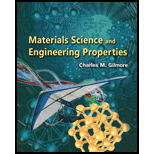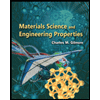
Materials Science And Engineering Properties
1st Edition
ISBN: 9781111988609
Author: Charles Gilmore
Publisher: Cengage Learning
expand_more
expand_more
format_list_bulleted
Concept explainers
Question
Chapter 10, Problem 6CQ
To determine
The electrode which is 1 molar solution of hydrogen ions in contact with hydrogen gas at 1 atm pressure.
Expert Solution & Answer
Want to see the full answer?
Check out a sample textbook solution
Students have asked these similar questions
A) # of Disinfection Clearwells: 3
B) Clearwell Operation Style: Parallel (to provide contact time for disinfection
using free chlorine (derived from a hypochlorite solution generated onsite).
C) The facility's existing system to generate hypochlorite onsite has reached
the end of its useful life, and the current operating capacity is insufficient
to generate the required mass flow of hypochlorite to accommodate the
future capacity of 34.5 MGD. Assume the facility plans to stop generating
hypochlorite onsite and will instead purchase a bulk solution of sodium
hypochlorite
D) Sodium hypochlorite (NaOCI) concentration: 6.25% NaOCI by mass
E) Bulk Density: 1,100 kg/m^3
F) Clearwell T10/DT Ratio: (CW1 0.43). (CW2 = 0.51), (CW3 = 0.58)
DT is the theoretical mean hydraulic retention time (V/Q)
G) pH: 7.0
H) Design Temperature: 15°C
1) 50% of Chlorine is lost in each clearwell
J) If the concentration going into the clearwell is C, then you can assume that
the concentration leaving the…
Please explain step by step, and show formula
Note:
Please deliver a clear, step-by-step simplified handwritten solution (without any explanations) that is entirely manually produced without AI assistance. I expect an expert-level answer, and I will evaluate and rate it based on the quality and accuracy of the work, using the provided image for additional reference. Ensure every detail is thoroughly checked for correctness before submission.
Chapter 10 Solutions
Materials Science And Engineering Properties
Ch. 10 - Prob. 1CQCh. 10 - Prob. 2CQCh. 10 - Prob. 3CQCh. 10 - Prob. 4CQCh. 10 - Prob. 5CQCh. 10 - Prob. 6CQCh. 10 - Prob. 7CQCh. 10 - Prob. 8CQCh. 10 - Prob. 9CQCh. 10 - Prob. 10CQ
Ch. 10 - Prob. 11CQCh. 10 - Prob. 12CQCh. 10 - Prob. 13CQCh. 10 - Prob. 14CQCh. 10 - Prob. 15CQCh. 10 - Prob. 16CQCh. 10 - Prob. 17CQCh. 10 - Prob. 18CQCh. 10 - Prob. 19CQCh. 10 - Prob. 20CQCh. 10 - Prob. 1ETSQCh. 10 - Prob. 2ETSQCh. 10 - Prob. 3ETSQCh. 10 - Prob. 4ETSQCh. 10 - Prob. 5ETSQCh. 10 - Prob. 10.1PCh. 10 - Prob. 10.2PCh. 10 - Prob. 10.3PCh. 10 - Prob. 10.4PCh. 10 - Prob. 10.5PCh. 10 - Prob. 10.6PCh. 10 - Prob. 10.7PCh. 10 - Prob. 10.8PCh. 10 - Prob. 10.9PCh. 10 - Prob. 10.10PCh. 10 - Prob. 10.11PCh. 10 - Prob. 10.12P
Knowledge Booster
Learn more about
Need a deep-dive on the concept behind this application? Look no further. Learn more about this topic, civil-engineering and related others by exploring similar questions and additional content below.Similar questions
- Please don't explain it. But draw it out for me kindly. And appreciate your time!. All the info is in the images. Thanks!.arrow_forwardDesign a simply supported one-way pavement slab for a factored applied moment, Mu = 10 ft-kip. Use f c’ = 5,000 psi and f y = 60,000 psi. The slab is in permanent contact with soil.Hint:• Estimate a minimum slab thickness for deflection control.• Solve for the slab steel based on cover for soil contactarrow_forwardThe figures below shows the framing plan and section of a reinforced concrete floor system. Floor beams are shown as dotted lines. The weight of the ceiling and floor finishing is 6 psf, that of the mechanical and electrical systems is 7 psf, and the weight of the partitions is 180 psf. The floor live load is 105 psf. The 7 in. thick slab exterior bay (S-1) is reinforced with #5 rebars @ 10 in. o.c. as the main positive reinforcement at the mid span, and #4 @ 109 in. for the shrinkage and temperature reinforcement. The panel is simply supported on the exterior edge and monolithic with the beam at the interior edge. Check the adequacy of the slab. Use the ACI moment coefficients. fc’ = 6,000 psi and fy = 60,000 psi. The slab is in an interior location. Hint: • Estimate total dead load. Find factored maximum positive bending moment in the end span. • Find design positive moment capacity. • Compare and determine adequacy, including safety and economy.arrow_forward
- 1 For an reinforced concrete two-way slab shown in figure under the load (P). (the slab continuous over all edges - all sides are fixed), Determine (By using yield line theory): A- Draw the Yield line Pattern B- Determine the moment m C- Find The required flexural steel to resist the loads causing the slab to collapse if P = 200 KN, f=28 MPa, fy = 420 MPa d = 120 mm. Use 10 mm bars. (Prin = 0.002) +2 m 6 m -8 m 3 marrow_forwardAt a point on the surface of a generator shaft the stresses are σx = -55MPa, σy = 25MPa and Txy = -20MPa as shown in Figure Q1. (a) Using either analytical method or Mohr's circle determine the following: Stresses acting on an element inclined at an angle 0 = 35°, i. ii. iii. The maximum shear stress The principal stresses and B. 25 MPa A 55 MPa 20 MPa Figure 1:Material stress state (b) Consider that the Young's modulus for the material, E = 200kPa and Poisson's ratio, v = 0.25. i. ii. determine associate strains for the material with the stress as shown in Figure 1 determine associate strains for the material with the stress at element oriented at 35° (question 1a(i))arrow_forwardA study reports data on the effects of the drug tamoxifen on change in the level of cortisol-binding globulin (CBG) of patients during treatment. With age = x and ACBG = y, summary values are n = 26, Σx, = 1612, Σ(x, - x)² = 3756.96, Σy, = 281.9, Σ(y, - y)² = 465.34, and Ex,y,= 16,745. (a) Compute a 90% CI for the true correlation coefficient p. (Round your answers to four decimal places.) (b) Test Hop=-0.5 versus H: p< -0.5 at level 0.05. Calculate the test statistic and determine the P-value. (Round your test statistic to two decimal places and your P-value to four decimal places.) z = P-value = State the conclusion in the problem context. ◇ Reject Ho. There is no evidence that p < -0.5. ○ Fail to reject Ho. There is evidence that p < -0.5. Reject Ho. There is evidence that p < -0.5. Fail to reject Ho. There is no evidence that p < -0.5. (c) In a regression analysis of y on x, what proportion of variation in change of cortisol-binding globulin level could be explained by variation in…arrow_forward
- For the frame and loading shown, determine the reactions at A and C. 24 Last 2 student ID+50 lbs 24 A 3 in. B A=Last 2 student ID+10 Inch B=Last 2 student ID+40 Inch A B Darrow_forwardThe figures below shows the framing plan and section of a reinforced concrete floor system. Floor beams are shown as dotted lines. The weight of the ceiling and floor finishing is 6 psf, that of the mechanical and electrical systems is 7 psf, and the weight of the partitions is 180 psf. The floor live load is 105 psf. The 7 in. thick slab exterior bay (S-1) is reinforced with #5 rebars @ 10 in. o.c. as the main positive reinforcement at the mid span, and #4 @ 109 in. for the shrinkage and temperature reinforcement. The panel is simply supported on the exterior edge and monolithic with the beam at the interior edge. Check the adequacy of the slab. Use the ACI moment coefficients. fc’ = 6,000 psi and fy = 60,000 psi. The slab is in an interior location. Hint: • Estimate total dead load. Find factored maximum positive bending moment in the end span. • Find design positive moment capacity. • Compare and determine adequacy, including safety and economy. C Darrow_forwardFor an reinforced concrete two-way slab shown in figure under the load (P). (the slab continuous over all edges - all sides are fixed), Determine (By using yield line theory): A- Draw the Yield line Pattern B- Determine the moment m C- Find The required flexural steel to resist the loads causing the slab to collapse if P = 200 KN, f=28 MPa, fy = 420 MPa d = 120 mm. Use 10 mm bars. Draw the yield line and (Qmin = 0.002) 2m solve PO 6 m 3 m -8 marrow_forward
- Find the internal torques for segments AB, BC, and CD (in N-m) by drawing the internal torque diagram, the maximum torsional shear on the shaft in MPa, and the relative rotation of section A with respect to section D in degrees.arrow_forwardFor an reinforced concrete two-way slab shown in figure under the load (P). (the slab continuous over all edges - all sides are fixed), Solve by using equilibrium method A- Draw the Yield line Pattern B- Determine the moment m C- Find The required flexural steel to resist the loads causing the slab to collapse if P = 200 kN, f=28 MPa, fy = 420 MPa d = 120 mm. Use 10 mm bars. (Pmin = 0.002) 2 m 6 m -8 m 3 marrow_forwardA double-T simply supported concrete beam its cross section is shown in Figure, is prestressed with 2 tendons each 400 mm². Determine the allowable service load. Use span 12 m, fse = 1300 MPa, fe = 40 MPa, y = 25 kN/m³. = 1200 mm >09 *100* As = 400 +100+ As = 400 400 1400+arrow_forward
arrow_back_ios
SEE MORE QUESTIONS
arrow_forward_ios
Recommended textbooks for you
 Materials Science And Engineering PropertiesCivil EngineeringISBN:9781111988609Author:Charles GilmorePublisher:Cengage Learning
Materials Science And Engineering PropertiesCivil EngineeringISBN:9781111988609Author:Charles GilmorePublisher:Cengage Learning

Materials Science And Engineering Properties
Civil Engineering
ISBN:9781111988609
Author:Charles Gilmore
Publisher:Cengage Learning
